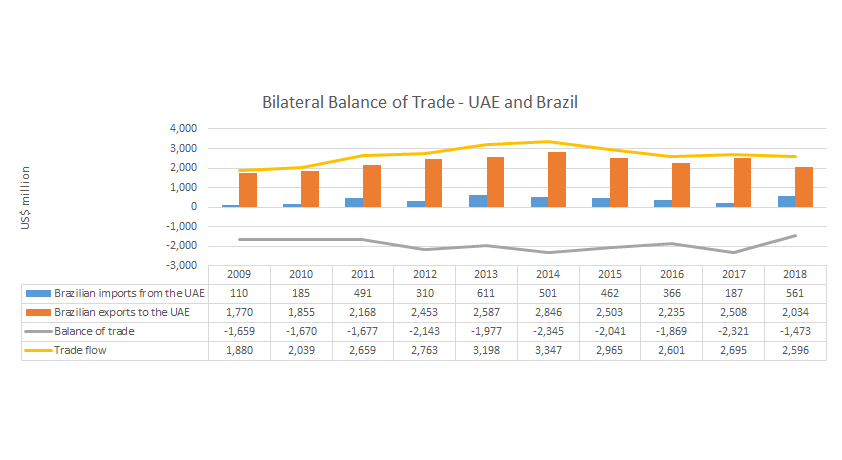query_builderUAE reduces trade deficit with Brazil
All News
->All Brazil News
Published: 1/7/2019
According to data from the Ministry of Industry, Foreign Trade and Services of Brazil, the United Arab Emirates has significantly reduced its trade deficit with Brazil in 2018, in comparison with the results achieved in the previous year. Brazil imported US$ 561 million from the UAE in 2018 and exported US$ 2,034 million, which resulted in a deficit of US$ -1,473. In 2017, the trade deficit was of US$ -2,321 million.
The deficit reduction achieved in 2018 results from two concomitant movements. Brazilian imports from the UAE grew 200% between 2017 and 2018, whereas exports to the UAE fell 19%. The increase in Brazilian imports from the UAE was not enough to compensate the decrease in exports in absolute terms, which translated into a small reduction of -3.7% in the total bilateral trade flow.
Over half of Brazilian imports from the UAE are mineral fuels. Fertilizers are the second category of products that Brazil imports the most from the UAE, accounting for almost 24% of the total. Other relevant categories of products are salt, sulphur; earths and stone; plastering materials, lime and cement; aluminum and articles thereof; plastics and articles thereof; electrical machinery and equipment; glass and glassware, among others.
As for Brazilian exports to the UAE, the main category of products is meat and edible meat offal, which accounts for 32.5% of the total. Sugar and confectionery accounts for 23.8% of total sales of Brazil to the UAE in 2018, occupying the 2nd position in the ranking. Other important categories of products are ores, slag and ash; natural or cultured pearls, precious or semi-precious stones, precious metals; mineral fuels; nuclear reactors; iron, steel and articles thereof; automotive vehicles, among others.
Brazilian imports from the world have increased for the second year in a row, after suffering drastic falls in 2014, 2015 and 2016, mostly due to the crisis that loomed over the country in that period. In 2017, the economy started to show its first signs of recovery, also reflected in an increase in imports. This trend maintained itself in 2018, when imports grew 20% in comparison to 2017. With expectations of economic growth of 2.5% in 2019, global exporters should take advantage of Brazil’s recovery to expand its market share and consolidate trade partnerships with the country.
Source: ComexStat/Ministry of Industry, Foreign Trade and Services of Brazil
-
No Attachments
